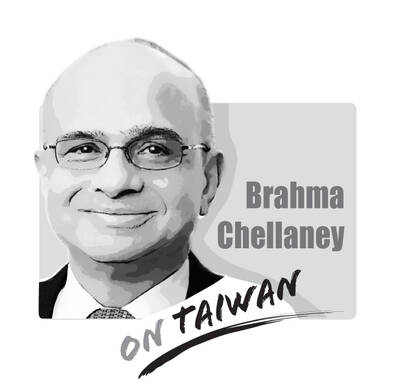Last week, two developments highlighted both the progress that has been made and the challenges remaining in improving local corporate governance.
On a positive note, the Cabinet on Thursday approved amendments to the Company Act (公司法) that will allow shareholders to vote electronically at annual general meetings. It came at a time when many listed companies have a tendency to shut out their shareholders by scheduling their annual general meetings all on the same date.
These companies will now find it harder to discourage shareholders from exercising their voting rights, because shareholders can use electronic voting to have a say on who sits on the board and other matters that affect their interests.
The amendments also require companies to adopt a cumulative voting system, rather than a block voting method, during the election of board members to safeguard the rights and interests of minority shareholders.
The beauty of the cumulative voting system is that it offers minority shareholders an option to either cast all their cumulated votes for one candidate or split the votes between candidates. For example, if a company is electing 10 directors, each share entitles the holder to 10 votes, which can all be cast for the same candidate or split among different candidates.
The purpose of adopting cumulative voting is to make sure that minority shareholders can get their favored candidates onto the board of the company to monitor corporate matters on their behalf.
It comes at a time when criticism has been mounting over the structure of boardrooms, as well as a lack of accountability and transparency in corporate dealings.
Cumulative voting is not perfect. If factionalism or partisan interests develop among majority and minority directors, it can undercut the board’s efficiency. There is also the concern that cumulative voting can be a convenient gateway for hostile takeovers and aggressive competitors could use the system to gain control of target companies.
However, cumulative voting does away with a dark side of the block system as the latter — which does not allow minority shareholders to stack up votes for specific candidates — tends to create a winner-take-all situation and excludes the representatives of minority shareholders from the board.
Even though the amendments are aimed at protecting shareholders’ rights and upholding corporate governance, the planned changes are about voting methods.
What we saw during the impasse at Taiwan International Securities Corp last week was more than a technical issue — it was the lack of a law-abiding spirit and an ignorance of corporate governance among certain shareholders.
So far, the competing shareholders at the brokerage firm have each claimed that they are the legitimate management of the company. They have submitted their filings to the authorities to justify their claims and have said they will lodge lawsuits against each other to protect their interests.
The financial regulator, in the meantime, has threatened to intervene and to ask for the court to put the firm into temporary receivership if the situation worsens.
Both competing sets of shareholders, as well as the relevant government agencies, must face up to the negative impact of the impasse on corporate governance in this country and efforts to attract foreign investors. Let’s hope all parties can settle the impasse soon; otherwise it will set a very bad example to foreign investors of Taiwan’s corporate governance.
Taiwan’s victory in the World Baseball Softball Confederation Premier12 championship is an historic achievement. Yet once again this achievement is marred by the indignity of the imposed moniker “Chinese Taipei.” The absurdity is compounded by the fact that none of the players are even from Taipei, and some, such as Paiwan catcher Giljegiljaw Kungkuan, are not even ethnically Chinese. The issue garnered attention around the Paris Olympics, yet fell off the agenda as Olympic memories retreated. “Chinese Taipei” persists, and the baseball championship serves as a reminder that fighting “Chinese Taipei” must be a continuous campaign, not merely resurfacing around international
Taiwan Semiconductor Manufacturing Co (TSMC) appears to be encountering some culture shock and safety issues at its new fab in Arizona. On Nov. 7, Arizona state authorities cited TSMC for worker safety violations, fining the company US$16,131, after a man died in May. The Arizona Division of Occupational Safety and Health released its six-month investigation into the fatality and cited TSMC for failing to keep the workplace free from hazards likely to cause death or serious harm. At about the same time, the chip giant was also sued for alleged discriminatory hiring practices favoring Asians, prompting a flurry of debate on whether TSMC’s
This month, the National Health Insurance (NHI) is to implement a major policy change by eliminating the suspension-and-resumption mechanism for Taiwanese residing abroad. With more than 210,000 Taiwanese living overseas — many with greater financial means than those in Taiwan — this reform, catalyzed by a 2022 Constitutional Court ruling, underscores the importance of fairness, sustainability and shared responsibility in one of the world’s most admired public healthcare systems. Beyond legal obligations, expatriates have a compelling moral duty to contribute, recognizing their stake in a system that embodies the principle of health as a human right. The ruling declared the prior

US president-elect Donald Trump is inheriting from President Joe Biden a challenging situation for American policy in the Indo-Pacific region, with an expansionist China on the march and threatening to incorporate Taiwan, by force if necessary. US policy choices have become increasingly difficult, in part because Biden’s policy of engagement with China, including investing in personal diplomacy with President Xi Jinping (習近平), has not only yielded little but also allowed the Chinese military to gain a stronger footing in the South China Sea and the Taiwan Strait. In Xi’s Nov. 16 Lima meeting with a diminished Biden, the Chinese strongman signaled little